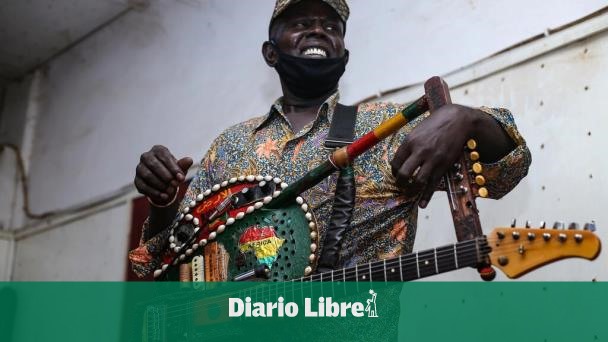Nuredin Jaber he plays some notes of traditional music with his “tambo-guitarra”, an African lyre connected to an electric guitar neck with which he wants to break the marginalization of his people, the Beja.
Together with a bassist, a saxophonist, a guitarist and two percussionists, this 47-year-old musician has achieved his childhood dream: to make Beja music known, the nomadic shepherds of the arid reliefs around the Red Sea.
In Sudan, the Beja (4.5 million people) represent 10% of the population. But there are also communities in Eritrea, Ethiopia and Egypt.
In Sudan“the Beja have always been marginalized,” laments Jaber.
“We want to change things, use music to draw attention to our problems,” Jaber tells AFP that, with his album “Beja Power”, which comes out in June, he wants to “give the Beja a voice.”
Under the rule of Arab culture
The Beja’s problem is simple: their region is one of the poorest in Sudan (in turn, one of the poorest countries in the world), despite the fact that its subsoil houses large amounts of gold.
In addition, it concentrates the ports of the Red Sea, the gateway for almost all of the country’s merchandise transport; but also from Chad, Ethiopia and the Central African Republic, landlocked states.
The Beja consider that they have been marginalized because they come from non-Arab ethnic groups. And that this process was accentuated during the 30-year dictatorship of Omar al Bashir, which fell in 2019 amid large demonstrations.
Despite everything, in Puerto Sudanthe town where Jaber comes from, the sounds of the rich Beja heritage, traditionally played on percussion, have survived.
Jaber founded in 2006 the music group “Dorpa”, “the group of the mountains” in Bedawi, a Beja dialect.
And he surrounded himself with musicians from different regions of Sudan to show the ethnic diversity of the country.
“The Arab culture from the center of the country was always predominant,” explains Jaber, despite the fact that this East African country was always closer culturally to the south and west of the continent.
“Unlike those who played Arab music, our concerts were stopped because we lacked authorization or for some other pretext,” he recalls.
music as a weapon
Bassist Abdelhalim Adam, who comes from the other end of the country, from Darfur (west), also knows the weight of the Arab cultural predominance.
For this member of the Peul ethnic group: “The struggle of the Beja is similar to that of our tribes in North Darfur”, where the civil war that began in 2003 between the Bashir regime and ethnic minority rebels left 300,000 dead and 2.5 million displaced, according to the UN.
To denounce discrimination in the country, Mohamed Abdelazim, who plays the conga (Cuban drum) in the group, decided to learn the rhythms of his region with Jaber.
Although “I’ve never been to the east,” he now knows “the way they play percussion. Which is very characteristic, with a very special rhythm.”
The Beja also took up arms against Bashir at the time, joining the 2019 demonstrations that ended his regime.
But the fall of the dictator did not end their suffering.
The transitional authorities promised to end the marginalization of non-Arab communities, but a military coup ended the fragile government.
Jaber is clear about his weapons: music, which makes the Beja “words travel”.


